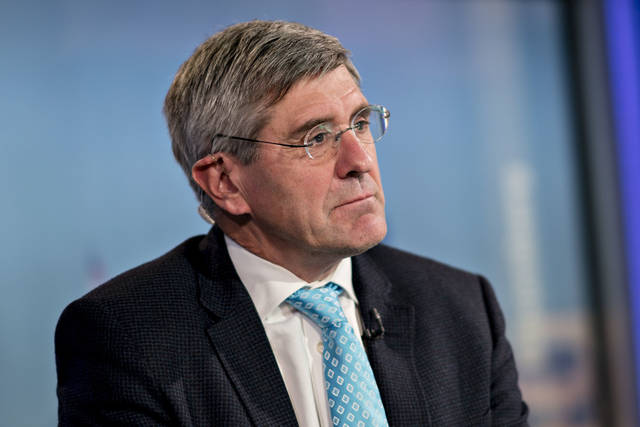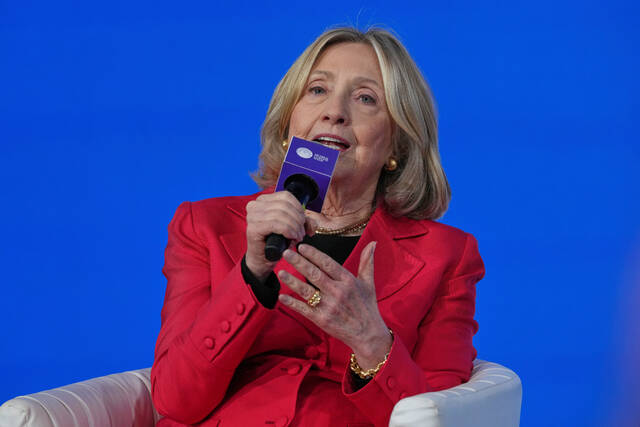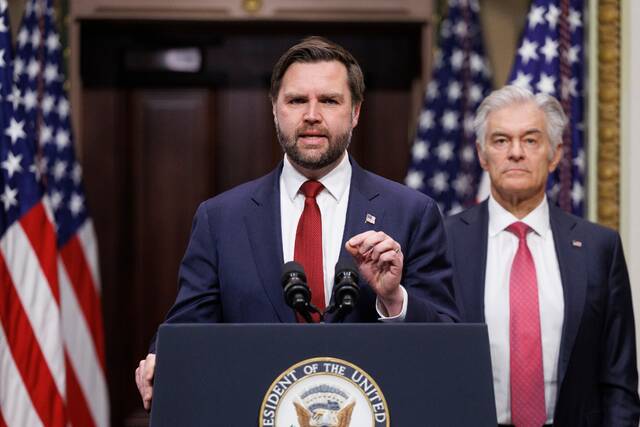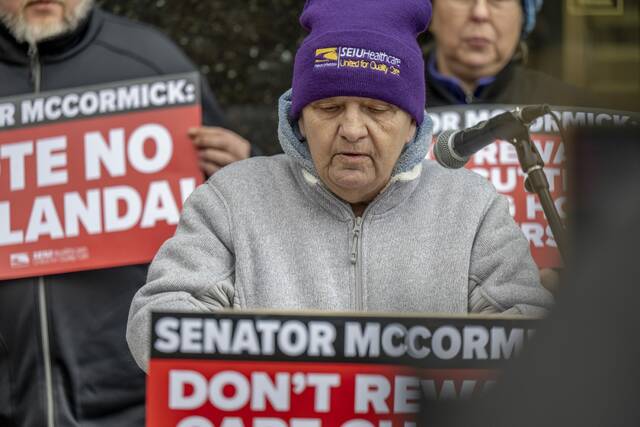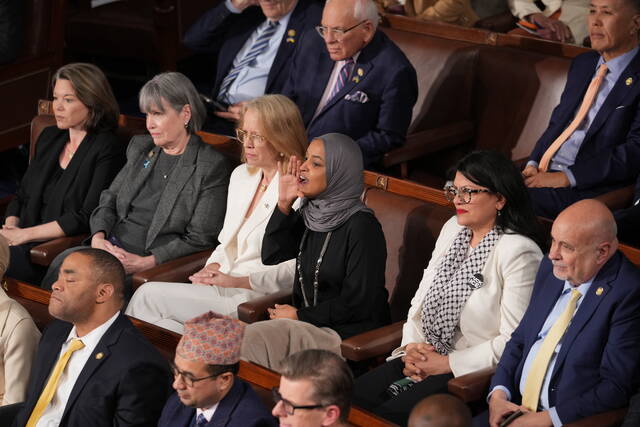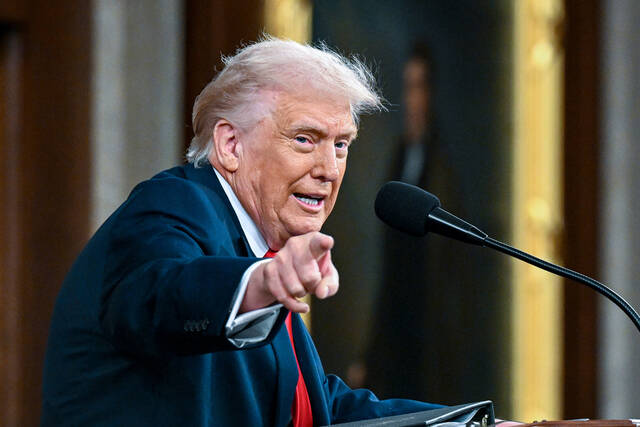WASHINGTON — President Trump was dealt another setback in his bid to put a political ally on the Federal Reserve Board as plans to appoint Stephen Moore, a conservative commentator and economist, collapsed amid a backlash sparked by Moore’s past writings and statements that disparaged women and gender equity.
Trump said in a tweet Thursday that Moore “has decided to withdraw from the Fed process.” It came just hours after Moore insisted publicly that he was not dropping out.
The president didn’t explain why Moore withdrew, but this week several Republican senators voiced doubts about his ability to win enough votes for confirmation.
In a letter to Trump, Moore, 59, said: “The unrelenting attacks on my character have become untenable for me and my family, and three more months of this would be too hard on us.”
BREAKING: President Trump says Federal Reserve critic Stephen Moore "has decided to withdraw" from consideration for the Fed board; follows similar withdrawal by Herman Cain; both faced stiff opposition, likely preventing potential confirmation. pic.twitter.com/cI28Ye5GFh
— MSNBC (@MSNBC) May 2, 2019
Moore is the second prospective Trump nominee to the Fed board to withdraw in recent weeks.
In April, Herman Cain, the restaurant executive and 2012 GOP presidential candidate, bowed out amid renewed concerns about previous allegations of sexual misconduct, which he has denied, and worries that his partisan support for Trump could undermine the independence of the Fed. Cain is chair of a political action committee called America Fighting Back, which seeks to fight negative media coverage of Trump.
Moore was a senior adviser on Trump’s 2016 presidential campaign. He has been a sharp critic of the Fed, calling its interest rate increases “malpractice” and insisting that policymakers reverse course by lowering rates — something Trump himself has repeatedly pressured the Fed to do.
Neither Moore nor Cain was formally nominated by Trump. The president took the unusual step of publicizing his plan to forward their names to the Senate before they were fully vetted.
The Trump administration offered no new names of potential nominees, but lawmakers of both parties said it would be wise for the White House to carefully screen candidates before deciding on whom to nominate.
“Everybody ought to be vetted as much as they could before they are seriously nominated because they will be vetted later,” Sen. Richard Shelby, R-Ala., a senior member of the Banking Committee, told Politico.
New: Stephen Moore has continued underpaying his alimony bills for years, even after he was found in contempt of court, leaving his ex-wife short by tens of thousands of dollars https://t.co/5t5987t8j9
— Jon Swaine (@jonswaine) May 2, 2019
Senate Minority Leader Chuck Schumer, D-N.Y., tweeted that Trump must now nominate “two serious candidates.”
Chris Rupkey, managing director and chief economist at MUFG Union Bank in New York, said it may be hard for Trump to find a candidate who meets his demands.
“Maybe (there’s) an academic with a conservative bent who might support the president’s economic policies and jawboning for lower interest rates,” Rupkey said. “It’s going to be a tough bill to fill.”
There are two open seats on the seven-member board of the Fed, which plays a crucial role in steering the economy largely by setting targets on key interest rates. Trump’s selection of Moore and Cain was seen by many as an attempt to install yes-men to the central bank ahead of next year’s election.
Moore has been an unabashed Trump loyalist, and some economists argued that he lacked the qualifications for the Fed position. Moore’s economic ideas have come under attack for being malleable and politically motivated, for instance stating that President Obama’s stimulus policies would trigger hyperinflation. And he has been criticized for flip-flopping. Previously, Moore called on the Fed to raise interest rates.
Moore’s personal reputation took a hit after reports, based on court records, that he had failed to pay alimony and child support, and that he had a $75,000 tax lien against him.
Even so, as the former chief economist at the Heritage Foundation, Moore was seen as having a reasonably good chance of being confirmed by the Republican-controlled Senate. That is, until the spotlight was turned on Moore’s writings on women.
Stephen Moore, President Trump's pick to head the Federal Reserve, has withdrawn, citing "unrelenting attacks on my character." CNN's KFile revealed decades' worth of disparaging comments Moore has made about women. https://t.co/V3R6rr5auK pic.twitter.com/a5nJjJuSeF
— CNN (@CNN) May 2, 2019
In his columns, Moore complained about equal pay for equal work and denigrated women’s involvement in sports, proposing in one article that female referees be banned from college basketball tournament games.
Moore has said that he regrets writing some articles and that he doesn’t remember others, some of which were published in the early 2000s. But given the sensitivity of gender issues in the current political climate, as reflected in the #MeToo movement and the record number of women elected to Congress last year, pressure has been mounting on lawmakers to oppose his candidacy.
As late as Monday, Trump’s chief economic adviser, Larry Kudlow, had said the White House remained behind Moore, even as his articles were being reviewed.
Congrats to Stephen Moore for getting in one last bad prediction before his nomination went down pic.twitter.com/jx1Xw4UGdd
— David A. Graham (@GrahamDavidA) May 2, 2019
At the same time, Moore had acknowledged that his articles on women could torpedo his nomination and said that he would drop out if he became a political liability.
Moore’s prospective appointment was all the more troubling because of his controversial views on women at a time when many have sought greater female representation at the traditionally male-dominated Fed and in professions such as economics.
“It’s not just a lack of understanding of the economy and the role of the Federal Reserve. It’s sexism and misogyny,” said Diane Swonk, chief economist at accounting and advisory firm Grant Thornton. “It’s not just offensive, but it’s offensive to the economy. It discourages growth.”
The Fed’s monetary policy is made by the seven-member board and five of 12 district presidents, four of whom serve on a rotating basis. A full term for a governor on the Fed board is 14 years.
Trump already has filled four board seats, none of which were seen as particularly partisan. Trump’s appointments have included the Fed’s current chairman, Jerome H. Powell, whom Trump has frequently criticized and reportedly contemplated firing, although it isn’t clear he has the authority to do so.
Trump sought to appoint Moore and Cain as he has become increasingly frustrated with the Fed. The president has repeatedly castigated the bank for raising interest rates, saying that economic growth and stock markets would be much higher today had the Fed not done so.
“The fact he was part of a package with Herman Cain tells you just how little this White House understands the Senate right now.” https://t.co/YfwIW2xxLw
— Robert Costa (@costareports) May 2, 2019
Trump has kept up the attacks even though the Fed stopped lifting rates after December and the main benchmark interest rate, at less than 2.5 percent, remains low by historical levels.
On Tuesday, as Fed officials met to discuss the economy and policy measures, Trump tweeted that interest rates should be cut by 1 percentage point and urged the Fed to further support growth by undertaking an unconventional stimulus program that was used to fight the Great Recession.
Despite the president’s jawboning and hopes among some investors for a rate cut, Fed policymakers Wednesday said they would stand pat on interest rates. They noted that the economy had been growing at a solid pace and that the current level of interest rates was appropriate, although it’s possible the Fed could cut rates if inflation stayed very low for a sustained period.
It isn’t surprising that presidents would want lower interest rates to foster economic growth, but Trump’s very public and forceful criticisms of the Fed are highly unusual. Experts have warned that in his efforts to influence the Fed by placing allies on the board, Trump is threatening to politicize the institution, which could damage its independence and credibility for nonpartisan policymaking.


